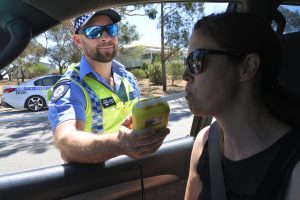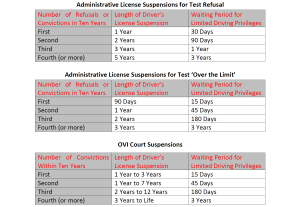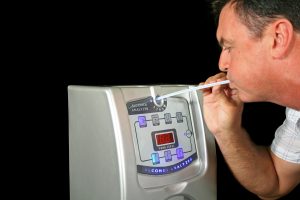
When an officer arrests a driver for DUI (called ‘OVI’ in Ohio), the officer typically requests that the driver consent to a blood, breath, or urine test. However, a statute in the Ohio Revised Code (section 4511.191) says a driver arrested for OVI implicitly consents to those tests. Can a driver arrested for OVI revoke that consent? This question has not been directly addressed in Ohio but was recently answered by the Supreme Court of Colorado.
 Columbus OVI/DUI Attorney Blog
Columbus OVI/DUI Attorney Blog


 The Ontario Provincial Police (OPP) recently
The Ontario Provincial Police (OPP) recently  Patrick Mahomes, Sr. was indicted for drunk driving in Texas. According to
Patrick Mahomes, Sr. was indicted for drunk driving in Texas. According to  You probably have heard of the Breathalyzer, but probably not the Brushalyser. Now you have. The Brushalyser is at the intersection of oral hygiene and traffic safety: it’s a toothbrush which doubles as a portable breath alcohol test. But should you rely on your toothbrush to determine whether it’s safe for you to drive?
You probably have heard of the Breathalyzer, but probably not the Brushalyser. Now you have. The Brushalyser is at the intersection of oral hygiene and traffic safety: it’s a toothbrush which doubles as a portable breath alcohol test. But should you rely on your toothbrush to determine whether it’s safe for you to drive? A recent study by Lending Tree addressed the generational differences in bad driving. The study analyzed the rates of driving incidents in four categories among five generations: Generation Z, Millennials, Generation X, Baby Boomers, and the Silent Generation. The
A recent study by Lending Tree addressed the generational differences in bad driving. The study analyzed the rates of driving incidents in four categories among five generations: Generation Z, Millennials, Generation X, Baby Boomers, and the Silent Generation. The  I came across
I came across  Muhammad Wilkerson, former defensive end for the New York Jets, was arrested for Operating a Vehicle under the Influence and Unlawful Possession of a Loaded handgun. Wilkerson’s arrest occurred in New Jersey. If Wilkerson were arrested for these offenses in Ohio, he would be charged with OVI and Improperly Handling Firearms in a Motor Vehicle. This article describes the elements, court process, and potential penalties for these offenses in Ohio.
Muhammad Wilkerson, former defensive end for the New York Jets, was arrested for Operating a Vehicle under the Influence and Unlawful Possession of a Loaded handgun. Wilkerson’s arrest occurred in New Jersey. If Wilkerson were arrested for these offenses in Ohio, he would be charged with OVI and Improperly Handling Firearms in a Motor Vehicle. This article describes the elements, court process, and potential penalties for these offenses in Ohio. Christmas and New Year’s Eve are the most-celebrated holidays in the United States. During the winter holiday season, people attend more work parties, family functions, and other social events than any other time of the year. After attending those events, people need a way to get home. Most of them drive, and some of them drive under the influence. The government knows this, so DUI (called ‘OVI’ in Ohio) enforcement is intensified during this time of the year.
Christmas and New Year’s Eve are the most-celebrated holidays in the United States. During the winter holiday season, people attend more work parties, family functions, and other social events than any other time of the year. After attending those events, people need a way to get home. Most of them drive, and some of them drive under the influence. The government knows this, so DUI (called ‘OVI’ in Ohio) enforcement is intensified during this time of the year. Ohio’s DUI laws (called ‘OVI’ in Ohio) criminalize driving with a prohibited breath alcohol concentration. To determine whether a person has a prohibited breath alcohol concentration, law enforcement officers use breath-testing machines. If a person refuses a breath test, there are consequences. However, differences in height, age, gender, and smoking habits make some people physically unable to provide a sufficient breath sample. As a result, some people are accused of refusing a breath test when they didn’t.
Ohio’s DUI laws (called ‘OVI’ in Ohio) criminalize driving with a prohibited breath alcohol concentration. To determine whether a person has a prohibited breath alcohol concentration, law enforcement officers use breath-testing machines. If a person refuses a breath test, there are consequences. However, differences in height, age, gender, and smoking habits make some people physically unable to provide a sufficient breath sample. As a result, some people are accused of refusing a breath test when they didn’t. The Chikushino Police Department has a program in which driving instructors test the driving skills of volunteers who are under the influence of alcohol. According to a
The Chikushino Police Department has a program in which driving instructors test the driving skills of volunteers who are under the influence of alcohol. According to a